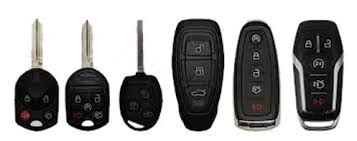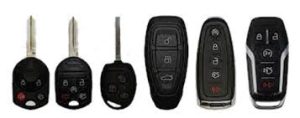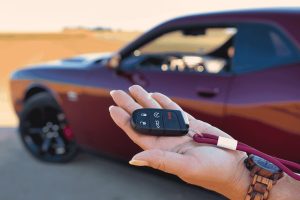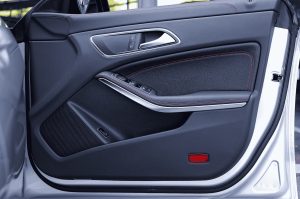Over the past three decades, car keys have evolved from a simple mechanical key to modern options offering enhanced vehicle security and comfort for the driver. With advancements in automobiles, different types of keys now cater to unique customizations like transponders or ignition keys. An automotive locksmith can help replace lost, stolen, or damaged keys, saving you from unforeseen expenses. Whether dealing with original keys or their modern replacements, knowing your key type is essential to making the right budget decisions.
Brief History of Car Keys
The key ignition system for cars was first introduced in the 1940s, marking a significant shift in how automobiles operated. The first automobile to use this system is believed to be a 1949 Chrysler model. These vehicles were initially secured with cylinder locks, similar to door locks. By the 1990s, the concept of centralized locking revolutionized car keys, offering more types and improved security. As automobile technology has progressed over the years, the variety of car keys available today has expanded. From mechanically cut keys to keyless options, there’s now a broad range of car key cuts in use, each with its unique features and benefits.
Types of Car Keys
Automobiles today come with a wide variety of unique modifications, from wheels to automotive key types. These keys have distinct features, with seven most common types of car keys available.
-
Mechanical Keys
Mechanical car keys were the most common type of vehicle key before 1995, resembling a standard house key without any built-in technology. These keys were used to unlock doors, start the ignition, and open the trunk in cars, offering an affordable option that was easy to replace. However, the disadvantage was their simple design, making them easy to duplicate using classic methods like a metal-cutting machine. Though inexpensive, their security was inferior compared to modern keys, which led car manufacturers to stop providing them in the late 1990s.
-
Transponder key
Introduced by automakers in 1995, the transponder key brought security-enhancing technology to car owners. Unlike traditional keys, it features an implanted microchip that communicates with the car’s computer when inserted into the ignition. This coded signal ensures the car only starts with the right key, making it more secure. While its black plastic shell adds durability, replacing a lost or broken transponder key can be expensive, with costs ranging from $40 to over $500 depending on whether you go to a dealership or a professional vehicle locksmith. Advanced versions like the rolling code introduced in 1999 provide a unique code each time, further boosting the security level. However, proper care is essential; protect it from moisture, heat, and items that may damage it.
-
Laser-Cut Key
A laser-cut key, as the name suggests, uses lasers to produce a complex key that is highly challenging to duplicate without the same equipment. While its intricate lock cylinders make it tough to pick, the drawback lies in its high cost for both acquisition and replacement.
-
Understanding Flip Key Issues
The flip key, popular nowadays for its contemporary design and convenient use, is a compact innovation in car keys. With a foldaway design, the key’s shank stays tucked away in the head, similar to a switchblade knife, making it easy to store in a pocket, bag, or even a wallet. A small button releases the shaft, which then folds back when not in use. While manufacturers have cleverly combined style and security, offering added security with this compact design, one drawback is that a replacement can cost anywhere between $200 and $300, though some options may be available under $75. Its technology ensures the key remains shielded and accessible, but users must handle it carefully to avoid damaging the complete device.
-
Smart Key Troubles
The smart key has become the new norm for the majority of vehicles, offering convenience and advanced features. It allows users to lock, unlock, and control the door, turn on, or turn off the alarm with just the key’s buttons. By simply pushing a button, the ignition starts, and the key communicates with the car’s computer through an encrypted infrared beam. These keys can even ensure cars lock themselves if the driver forgets and walks far away. However, the drawback is that if lost or damaged, they are expensive to replace, costing between $200 and $400. Replacement often requires a visit to the dealership, as the antennas in the vehicle’s interior must detect the key’s presence to function properly.
-
VATS Key
The VATS key features a resistor incorporated into the key blade for added security, making it difficult to duplicate. With 15 different values, its drawbacks include a high cost and potential difficulty in obtaining replacements if something happens to the key.
-
VALET Key
The VATS key is a smart option for added security, featuring a resistor incorporated into the key blade to prevent duplication. With 15 different values, it is difficult to copy and provides protection against theft. However, its drawbacks include a high cost and potential difficulty in obtaining replacements if something happens to the original. Similarly, valet keys are designed for valet services, allowing a car owner to pass over a spare valet key with limited functionality for parking purposes. These customized keys ensure secure handling but are not equipped in all cars, leaving some car owners questioning the need for them in everyday situations.
Conclusion
Car keys have come a long way since 1910, with technological advancements like transponder chips, remote keys, and smart keys that have completely revolutionized vehicle security. Each type is designed to be durable and serve its purpose as long as possible, but they can still break, become damaged, or get lost or stolen. When this happens, automotive locksmith services can fix the issue quickly and efficiently, ensuring you get back on the road without hassle.






